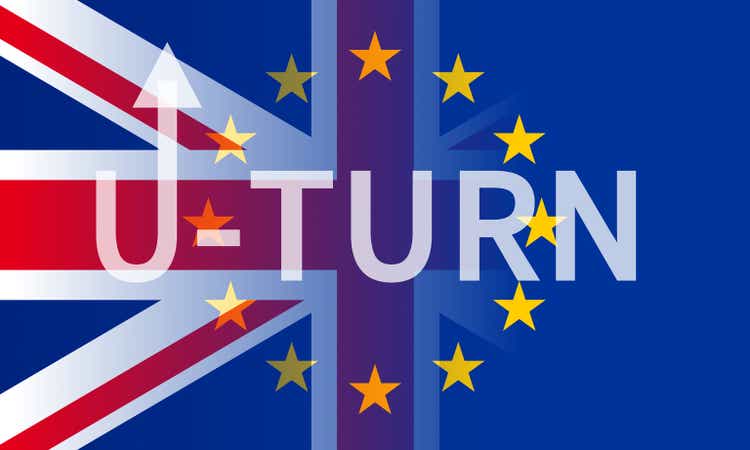G0d4ather/iStock via Getty Images
Today, new UK chancellor Jeremy Hunt made a fiscal policy statement that took back most of the tax cuts announced by his predecessor. The guidance was needed to restore a semblance of normality and order in UK bond markets and the pound exchange rate. The rise in gilt yields had threatened a liquidity crisis for UK pension funds that was only averted by swift intervention by the Bank of England.
New chancellor bids to restore confidence
Three weeks is an eternity when dealing with a crisis in financial markets. Huge bond market and exchange rate volatility forced the UK government into several U-turns after former Chancellor Kwasi Kwarteng delivered his mini-budget on Sept. 23. To say that the fiscal package was poorly received in markets would be an understatement. Reversing the abolition of the 45p additional tax rate was nowhere near enough to restore confidence in financial markets. In the end, Mr. Kwarteng was sacrificed and stood down to be replaced by Jeremy Hunt, a former rival of prime minister Liz Truss for the leadership of the governing Conservative Party.
The unfunded tax cuts announced by the previous chancellor were the largest that Britain had seen since the 1970s. Analysis by the Resolution Foundation published after the mini-budget suggests that borrowing would have risen by a stunning £265bn over the next five years compared to the OBR’s forecast in March. Gilt yields surged as the bond market lost confidence in the government’s ability to keep government debt in check. The Bank of England had to intervene and buy UK government bonds to ease liquidity strains on pension funds caused by their interest rate hedging strategies.
Sterling crisis still not inevitable
Today, Mr. Hunt made a snap statement on fiscal policy that was brought forward to calm markets. Further changes were made to the mini-budget. The government announced that almost all tax cuts would be reversed. Importantly, the basic rate of income tax remains at 20% rather than be reduced to 19%. In addition, Liz Truss had flagged last week that the corporate tax cut will be scrapped, too. The measures raise an additional £32bn compared to the mini-budget. In addition, the energy price guarantee scheme in its current form will only last for six months rather than two years. Mr. Hunt did not spell out any further spending cuts but is likely to do so over the next days and weeks.
As I argued in a previous blog, a sterling crisis is not inevitable if the government and the Bank of England work together to restore confidence in the markets. The central bank had done some heavy lifting with its intervention in the gilt markets and is expected to raise interest rates by 100 basis points at its next meeting in November. Today’s announcement eases the pressure on the Bank of England to do even more, which will be a relief to UK mortgage borrowers.
The bottom line
Today’s snap fiscal statement by the new UK chancellor Jeremy Hunt reverses most of the tax cuts of the mini-budget and was badly needed to restore some confidence in financial markets. It increases the chances for the pound sterling to stabilize and eventually recover from its historically low levels.
Disclosures
These views are subject to change at any time based upon market or other conditions and are current as of the date at the top of the page. The information, analysis, and opinions expressed herein are for general information only and are not intended to provide specific advice or recommendations for any individual or entity.
This material is not an offer, solicitation or recommendation to purchase any security.
Forecasting represents predictions of market prices and/or volume patterns utilizing varying analytical data. It is not representative of a projection of the stock market, or of any specific investment.
Nothing contained in this material is intended to constitute legal, tax, securities or investment advice, nor an opinion regarding the appropriateness of any investment. The general information contained in this publication should not be acted upon without obtaining specific legal, tax and investment advice from a licensed professional.
Please remember that all investments carry some level of risk, including the potential loss of principal invested. They do not typically grow at an even rate of return and may experience negative growth. As with any type of portfolio structuring, attempting to reduce risk and increase return could, at certain times, unintentionally reduce returns.
The information, analysis and opinions expressed herein are for general information only and are not intended to provide specific advice or recommendations for any individual entity.
Frank Russell Company is the owner of the Russell trademarks contained in this material and all trademark rights related to the Russell trademarks, which the members of the Russell Investments group of companies are permitted to use under license from Frank Russell Company. The members of the Russell Investments group of companies are not affiliated in any manner with Frank Russell Company or any entity operating under the “FTSE RUSSELL” brand.
The Russell logo is a trademark and service mark of Russell Investments.
This material is proprietary and may not be reproduced, transferred, or distributed in any form without prior written permission from Russell Investments. It is delivered on an “as is” basis without warranty.
UNI-12126
Editor’s Note: The summary bullets for this article were chosen by Seeking Alpha editors.


Be the first to comment